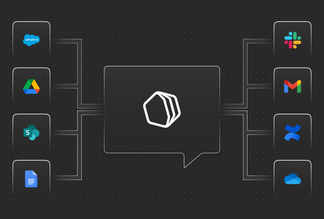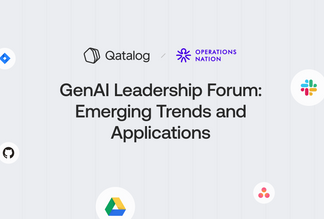
The calm before the storm
This is the calm before the AI storm.
That might sound strange, given the explosion of generative AI models and tools over the last twelve months, but this is just the beginning. The clouds are gathering and the wind is picking up, but we’ve seen nothing yet.
In the next few months and years, we will see a fundamental transformation in the nature of work and companies. Large scale automation is coming, and not just for roles dominated by repetitive work. AI will drastically increase productivity in fields where automation and economies of scale were previously very rare, across a huge variety of highly skilled, creative, and ‘white collar’ jobs.
We’ll see an entirely new economic frontier emerge, accompanied by disruption on an unprecedented scale. We are sleepwalking into a hurricane and we are woefully unprepared.
The automation of knowledge
100 years ago, the assembly line for a car involved hundreds of people each with their own specific task. They were aided by machinery, but it was still a very labor intensive process. Today, advanced robotics means the vast majority of these tasks are now automated, with a much smaller number of humans overseeing the process.
Most companies in the modern economy are factories for information. The assembly line sees existing knowledge infused with new ideas and concepts to produce services, products, and new knowledge. Again, the process for doing this is very labor intensive, with a huge number of (often highly skilled) people required to make this happen.
The reason large language models (LLMs) are so transformative is because they enable information to be manipulated, analyzed and processed far more efficiently and accurately at a much greater scale than humans can ever be capable of. But a clear consequence of this is that many roles will inevitably be eliminated.
Let’s take a corporate law firm as an example. Today, you might have a team working on a transaction, where someone responsible for due diligence, another who drafts the agreements, someone who assesses regulatory approvals, and another person who reviews everything, before it goes to the Partner. Fairly soon, you’ll only need a Partner who assigns these tasks to autonomous AI agents that are powered by a specialized LLM. The assembly line has become almost entirely automated, overseen by a fraction of the initial workforce.
Of course, the inputs here are critical, as it’s likely the Partner will require some original thought and a clear idea of how they want to approach the transaction in the first place, which will guide the specific instructions provided to the AI agents. They will also be responsible for reviewing the outputs from the AI, and determining the next course of action. This demonstrates the potential inequity created by AI, where some roles will become much more valuable, while others disappear entirely.
This is possible today
This is not something we need to start worrying about in a few years. It’s already possible today. I know this because I’ve spent the last 18 months up close to this technology, building products and systems that leverage LLMs.
As an example, we now have a system at Qatalog that uses our own AI models to automate our marketing and onboarding flow. First, it programmatically generates customized and highly targeted online adverts, including text and images. That ad takes you to a brand new AI generated landing page, which shows you what Qatalog’s custom software platform would look like for your business, because our AI model ‘understands’ our product and how it can be used by different industries. Then, if you want to use that custom product, it’s built and ready to use almost instantly.
Rapid progress
What’s even more remarkable is that we are just at the beginning of this shift, but the speed of progress when it comes to LLMs means change will happen fast. Whether it’s from an academic paper or an open-source model, there is a major breakthrough almost every week that allows us to train models faster, cheaper, or with less compute power, often by orders of magnitude.
This is not normal. You might think we have suddenly cracked the code to problem solving and innovation. But the technology itself is the reason. Researchers and academics have been using LLMs to solve complex problems and trawl through existing literature at lightning speed for new connections and potential answers. Each time LLMs improve, our ability to create better LLMs does too. But this is also an early indication of how this technology will drastically expand the scale and scope of what humans can achieve, and we’ll see this recursive and exponential pace of improvement will permeate every industry, sector and practice.
A false sense of security
Given what’s coming, you’d think we’d be worried. But we've been lulled into a false sense of security.
Qatalog surveyed 2,600 knowledge workers in the US and UK to understand their perception of AI. The first half were surveyed in early November 2022 (shortly before the launch of ChatGPT), and then again in April 2023. The results reveal that knowledge workers are more confident AI can help them work faster, but have less confidence in an AI’s ability to fully automate parts of their role, while the perceived threat level from AI has actually reduced.
So, what’s going on? The dominance of ChatGPT (and similar tools) in public discourse has fooled people into thinking there’s nothing to worry about, because ChatGPT is highly prone to hallucinations and, for lots of people, it feels more like a fun tool to play with.
In reality, the AI models we have today are phenomenally powerful and, with the right scaffolding and domain focused training, are already capable of large scale automation, as in the example from Qatalog above.
A pandemic style response
You might argue this lends credence to the calls from prominent figures to pause AI development, but that ship has sailed. Large parts of the technology is now open-source and run on almost any computer in the world and they are catching up every week. We’ll still need regulation to provide guardrails, but the genie is out of the bottle and there’s no going back.
All of this means it’s now time to think about how we adapt, whether as individuals, as companies, and for society as a whole. When the covid pandemic emerged, trillions of dollars were made available to protect people’s health, safety and the economy. That is the scale of action required right now.
Download ‘The AI Workforce’ now to view the white paper, which includes:
-
Survey data on how knowledge workers view of AI has shifted
-
Predictions for the short-term and longer-term impact of AI on the workforce
-
Policy recommendations to mitigate the damage



